Slashing $2 Trillion from "The Swamp"--Three Things
November 27, 2024
There is no way to cut federal spending without reconfiguring the economy from the ground up, starting with healthcare.
The words "government" and "efficiency" are rarely found in each other's company, because efficiency isn't integral to the function of government the way it is in private enterprise.
Efficiency is an oft-stated goal, of course, and given ample lip-service in PR, but the coin of the realm in government isn't efficiency, it's influence, as the squeakiest wheels get the grease, and those funding elected officials' campaigns and greasing lobbyists' palms are very squeaky indeed.
Which brings us to the second thing: who does "The Swamp" work for? The naive answer is "The Swamp works for itself, feathering the bed of millions of bureaucrats." This answer reflects the importance of serving self-interest, always a good starting point, but it doesn't really do the heavy lifting, which requires following the money and asking who gets to distribute the money.
Who distributes the federal government's trillions? The elected officials in Congress. Yes, "The Swamp" works for Congress. And since members of Congress each need millions of dollars every election cycle to win re-election, "The Swamp" also works for lobbyists and those who hire them: corporations, banks, financiers, interest groups, think tanks, and the rest of the sprawling ecosystem that extends far from federal bureaucrats into every nook and cranny of the American economy.
If we follow the money, we find the vast majority of the $6.75 trillion that flows through federal coffers goes to private sector businesses, institutions such as universities and individual Americans. A small slice funds the federal bureaucracy which is "The Swamp" in the popular imagination.
Here is my chart of the ecosystem nurtured by federal spending. Please note the vast reach of many key parts of this ecosystem, and ask yourself if any one of these many parts has a presence in your county. The answer will be "yes."
Is there a college or university in your county? It's partially funded by "The Swamp." Is there a highway in your county? It's funded by "The Swamp." Is there a military base, or company with a defense or Department of Energy or NASA contract somewhere in its revenue stream? It's funded by "The Swamp," too.
It's a useful exercise to actually read the emails sent by your congressional representative, touting all the federal funding being funneled to your congressional district. Much of this funding is for infrastructure that probably doesn't have as much fat in it as we'd like to believe, since the work is put out to bid, just like a private-sector contract: bridge repairs, sewage treatment upgrades, environmental projects, new gym for the school, and so on.
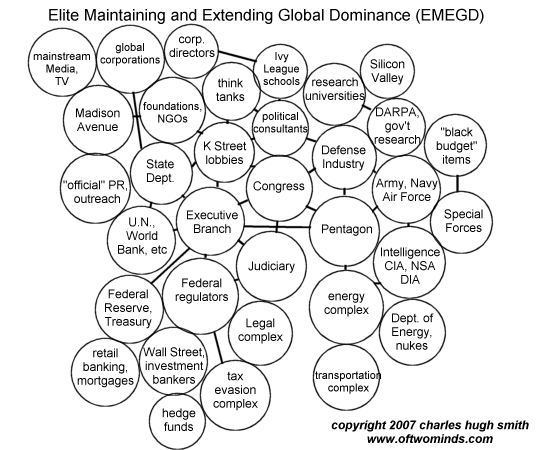
A good place to start exploring federal spending and revenue is
FiscalData -- Treasury.gov, which helpfully reminds us that:
According to the Constitution's Preamble, the purpose of the federal government is "...to establish Justice, insure domestic Tranquility, provide for the common defense, promote the general Welfare, and secure the Blessings of Liberty to ourselves and our Posterity." These goals are achieved through government spending.
Here is a snapshot of federal spending. Note that 44% is consumed by Social Security, Medicare and Medicaid. Most of the $1.2 trillion distributed to Social Security recipients flows directly into the economy as those monthly payments are spent. As for Medicare and Medicaid, most of the money flows to private-sector healthcare, a vast industry with an infinite appetite for more funding.
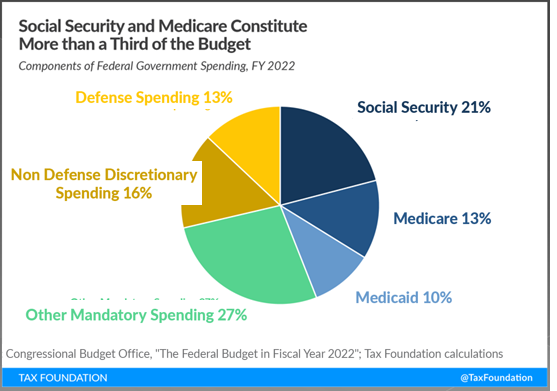
These two sectors--retiree pensions and disability (Social Security) and healthcare (Medicare and Medicaid), along with interest on the ballooning federal debt, account for 80% of projected increases in spending.
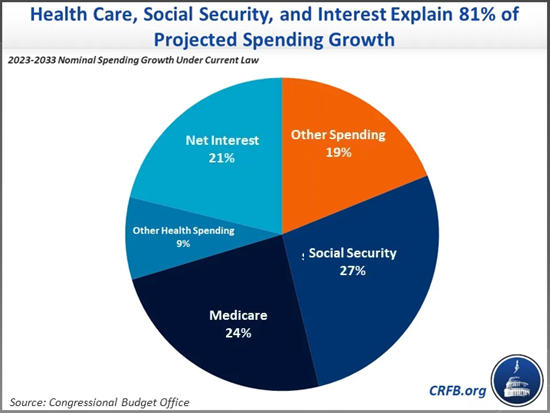
Going back to the chart of federal spending, note that tasty looking morsel labeled "non-defense discretionary spending." Yowza, now that sounds like the perfect place to slash a trillion bucks of fat. But not so fast, big fella--that "fat" is what elected members of Congress count on to reward their campaign contributors and their constituents to ensure their re-election. You will cut that "fat" over the dead bodies of every member of Congress, which we must recall, control the distribution of the federal funding.
So where do we start? I've often observed that if we don't completely reconfigure healthcare in the U.S., Medicare and Medicaid will bankrupt the nation all by themselves.
We might also note the infinitesimal percentage of the budget devoted to various popular bugaboos such as "foreign aid," much of which is actually grants or loans to buy American-made goods and services. Yes, this is an annoying waste of money, but eliminating this funding of U.S. made goods and services won't really move the needle. And let's be realistic: every global power spreads money around the world in one form or another.
In other words, the empire won't run itself, pal, it takes loot, so touche pas au grisbi.
You can explore the foreign aid "swamp" here:
ForeignAssistance.gov
How Much Does the Government Spend on International Affairs?
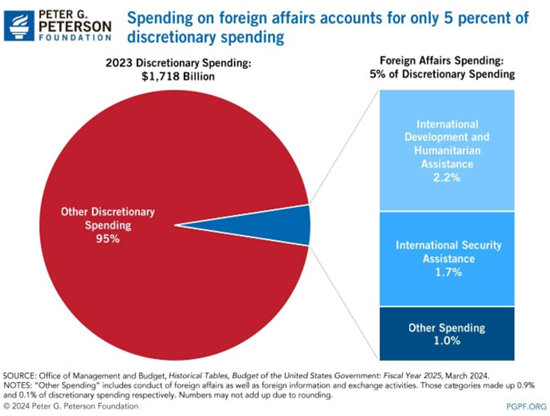
What every American should know about US foreign aid:
Myth #1: America spends too much on foreign aid:
Opinion polls consistently report that Americans believe foreign aid is in the range of 25 percent of the federal budget. When asked how much it should be, they say about 10 percent. In fact, at $39.2 billion for fiscal year 2019, foreign assistance is less than 1 percent of the federal budget.
Then there's the $700 hammers in the defense budget. That fat is just waiting to be slashed. Alas, things are more complicated than we would like. Thanks to decades of relentless consolidation / centralization of industrial production, banking, etc.--the entire core of the U.S. economy--there are only a few corporations that can fulfill Pentagon orders. Yes, there are hopeful signs of startups competing for drones and other small-scale military weaponry, but when it comes to aircraft carriers, nuclear submarines and renovating the nation's nuclear weapons stockpile, there are not many private-sector options--in many cases, there's only one.
So dig into the defense budget, and the handful of corporations getting most of the dough. Seek out the black budget of the Intel "Community" (yes, a tightly knit bunch of folks), and find a couple hundred billion to slash. You won't find much to slash in the name of efficiency, because the Intel Community isn't about efficiency.
By all means, go over the entire $6.75 trillion federal budget line by line, draw all the lines from members of Congress to various centers of influence, locate all those who you're about to cut off at the knees, and then slash away. And while we're slogging through the slashing and burning of other folks' livelihoods, let's spend a moment pondering this chart of the federal debt--the government spending more than it collects in revenues--and the net worth of the top 1% and the net worth of the bottom 50%.
Is it mere coincidence that the top 1%'s net worth has risen in lockstep with federal debt, or are these two statistics correlated, that is, federal spending increases the wealth of the top 1% far more than it benefits the bottom 50%. Recall that most of the federal spending flows through to individuals and private-sector companies, the majority of which are owned by the top 1%, who constitute a very influential center of influence.
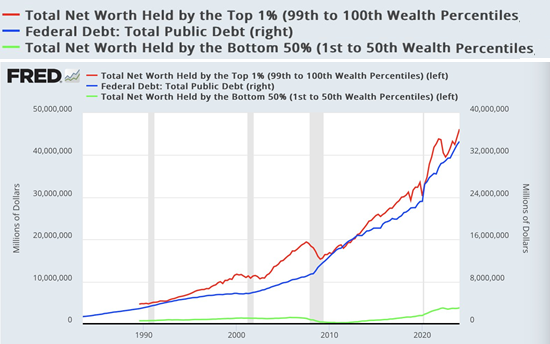
Cut off the gravy train of the top 1% and they'll respond in kind. Hell hath no fury like a billionaire scorned.
Let's recap our exploration of slashing $2 trillion from "The Swamp."
1. The Swamp itself consumes a small percentage of the federal budget. The majority of the money goes to individuals and private-sector entities.
2. The Swamp works for the elected members of Congress, who distribute federal monies, and all those who influence members of Congress, i.e. lobbyists working for private-sector interests.
3. There is no way to cut federal spending without reconfiguring the economy from the ground up, starting with healthcare, the relentless consolidation of companies and the distortions created by the immense concentration of wealth and influence in the hands of the top 0.1%.
Slashing any spending will take every ounce of political capital any administration can bring to bear. The "debate" will very quickly lead to images of folks in unemployment lines and retirees eating Friskies cat food because they can no longer afford the value meal at MickeyDs. Those actually reaping the handsome gains of federal spending will be nowhere in sight.
My recent books:
Disclosure: As an Amazon Associate I earn from qualifying purchases originated via links to Amazon products on this site.
The Mythology of Progress, Anti-Progress and a Mythology for the 21st Century print $18, (Kindle $8.95, Hardcover $24 (215 pages, 2024) Read the Introduction and first chapter for free (PDF)
Self-Reliance in the 21st Century print $18, (Kindle $8.95, audiobook $13.08 (96 pages, 2022) Read the first chapter for free (PDF)
The Asian Heroine Who Seduced Me (Novel) print $10.95, Kindle $6.95 Read an excerpt for free (PDF)
When You Can't Go On: Burnout, Reckoning and Renewal $18 print, $8.95 Kindle ebook; audiobook Read the first section for free (PDF)
Global Crisis, National Renewal: A (Revolutionary) Grand Strategy for the United States (Kindle $9.95, print $24, audiobook) Read Chapter One for free (PDF).
A Hacker's Teleology: Sharing the Wealth of Our Shrinking Planet (Kindle $8.95, print $20, audiobook $17.46) Read the first section for free (PDF).
Will You Be Richer or Poorer?: Profit, Power, and AI in a Traumatized World
(Kindle $5, print $10, audiobook) Read the first section for free (PDF).
The Adventures of the Consulting Philosopher: The Disappearance of Drake (Novel) $4.95 Kindle, $10.95 print); read the first chapters for free (PDF)
Money and Work Unchained $6.95 Kindle, $15 print) Read the first section for free
Become a $3/month patron of my work via patreon.com.
Subscribe to my Substack for free
NOTE: Contributions/subscriptions are acknowledged in the order received. Your name and email remain confidential and will not be given to any other individual, company or agency.
|
Thank you, Shane H. ($70), for your monstrously generous subscription to this site -- I am greatly honored by your support and readership. |
Thank you, Howard S. ($70), for your superbly generous subscription to this site -- I am greatly honored by your support and readership. |
|
|
Thank you, Robust Estimator ($70), for your marvelously generous subscription to this site -- I am greatly honored by your support and readership. |
Thank you, Whole Sight ($7/month), for your splendidly generous subscription to this site -- I am greatly honored by your support and readership. |